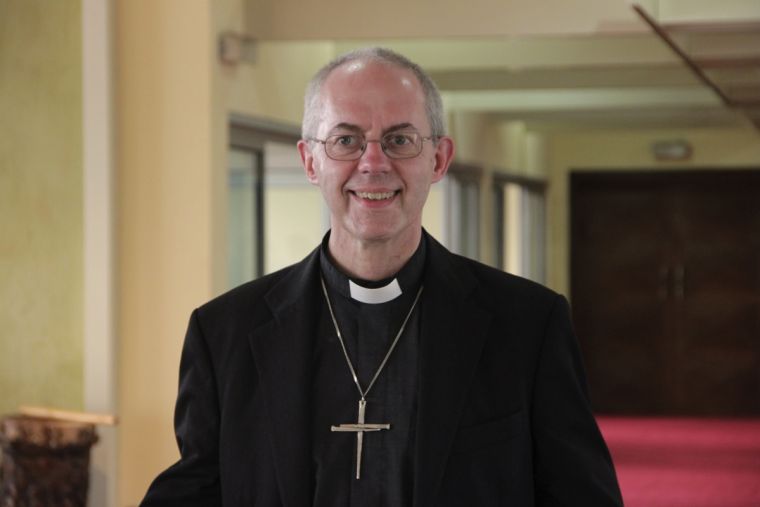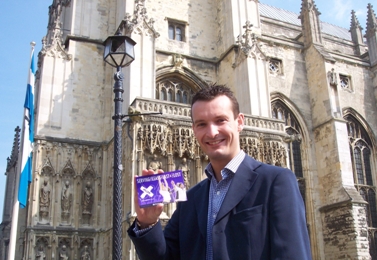Archbishops set aside Pentecost 2016 in bid to evangelise England

The Archbishop of Canterbury is heading the biggest evangelism project in the UK so far this millennium. Every cathedral, church and clergyman and woman in the land is being urged to share their faith and win new converts to Christianity.
Cathedrals and churches are being urged to set aside the week before Pentecost as a week of prayer for evangelism.
The Archbishops of Canterbury and York, Justin Welby and Dr John Sentamu, are calling cathedrals and other churches to use the week running up to Pentecost Sunday on May 15 to pray for new followers to Christ.
The entire Church is being urged to pray throughout the week for "all Christians to deepen their relationship with Jesus" in order to have "confidence" to share the faith. The aim is for "all to respond to the call of Jesus Christ to follow him."
The two Archbishops are currently writing to all 11,300 Church of Engand clergy inviting them to "engage" with the project. They are being asked to organise round-the-clock prayer marathons, one-off events and other meetings and gatherings to help towards the evangelisation effort.
Five or six cathedrals will hold "beacon" events with services and events led by both Archbishops and some bishops, evangelical worship leaders such as Matt Redman, Tim Hughes and Martin Smith and in collaboration with 24-7 Prayer.
Project leader Emma Buchan said: "The hope is that in many places, Christians across denominations and streams can pray together, as the unity of the whole Body of Christ is a powerful reality and symbol to the world."
Churches are to be given new questions and guidelines to help them evangelise in their local communities. The Archbishops are currently surveying attitudes to Christianty among the wider population to help with this. Existing research shows many clergy prioritise taking services, prayer, preaching and pastoral work over evangelisation.

Videos are also being made to help build "confidence in faith-sharing".
The new evangelisation initiative is the latest in nearly a century of outreach.
The most controversial was the 1945 report, Towards the Conversion of England, which restated Reformation teachings on subjects such as the Day of Judgement. This led up to the foundation of the Eclectic Society by the massively-influential John Stott and then, later, the setting up of the Church of England Evangelical Council. More recently there was the Decade of Evangelism in the 1990s, mirrored by the Catholic Church's Decade of Evangelisation.
The plans are outlined in the General Synod report of the Archbishops' Evangelism Task Group, where the two Archbishops say: "Sharing Christ with others is a joyful, encouraging and empowering feature of being a Christian disciple."
They set up the group in response to a call by the General Synod in November 2013. They say: "The group is seeking to be provocative, in order that effective evangelism may become a constant feature of ministry and mission across the dioceses and parishes of the Church of England."
The group includes Canon Mark Russell, chief executive of the Church Army, who is working on evangelisation of young people, Amy Orr-Ewing, director of the Oxford Centre for Christian Apologetics and Rev Elizabeth Adekunle, Archdeacon-designate of Hackney, who is helping with black and ethnic minority issues.

Canon Russell says in the report that among questions that people taking part will be asked is: "What holds us back from sharing our faith?" People will also be asked to think of what they could do to enable those without faith "to come to faith in Jesus."
As an example of the challenges ahead, at their first meeting, all the members of the task group discovered they had become Christians in or before their mid-teens. "This realisation brought into sharp focus the challenge the Church faces in reaching younger people with the good news of the Gospel," he says. "While we recognise that we should not be driven by a sense of fear or anxiety, the current and future health of the Church of England depends on a renewed sense of urgency to engage with children and young people."
Bishop of Liverpool Paul Bayes says in the introduction that evangelism is not a matter for politics, for anxiety or stress, for winning or losing or for the "exchange of labels".
"Sharing the gift of Christ is an act of love. People who are in love share the news of their love without strain and without force, though of course it can take courage to admit that one loves, and is loved."











